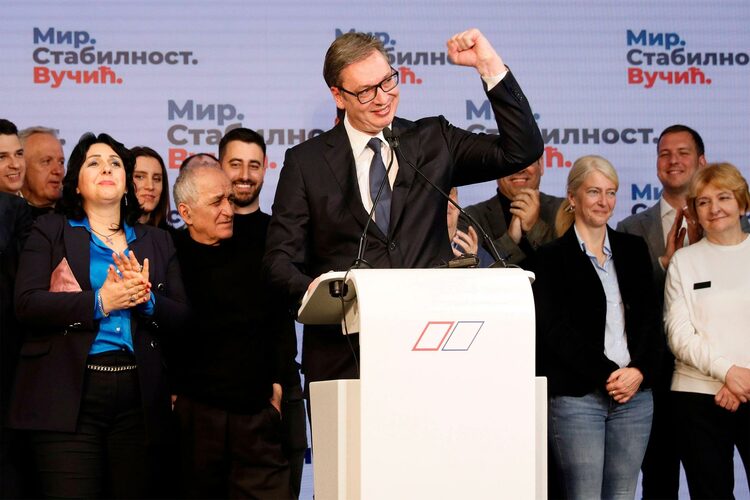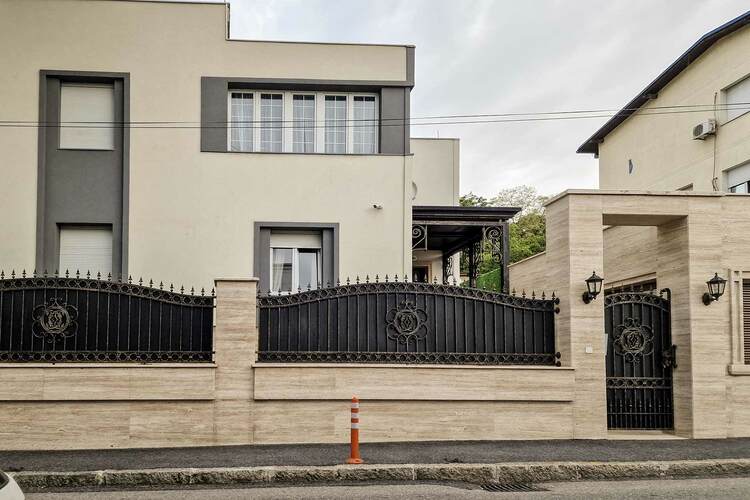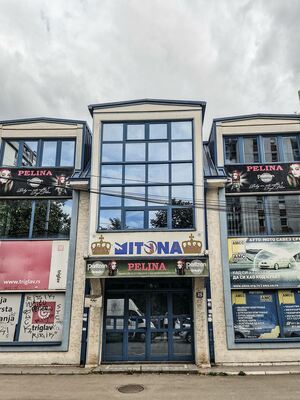Sanctions haven’t stopped notorious Serbian arms merchant Slobodan Tešić
Despite repeated rounds of sanctions, the notorious arms dealer Slobodan Tešić remains a dominant player in Serbia’s weapons trade.
A leaked chat and other evidence suggests he has taken over a company that once answered to his top competitor.
Selling weapons to a warlord, allegedly paying “large bribes” to secure contracts, and courting clients with luxury vacations have landed Slobodan Tešić on numerous blacklists over the years.
But that has never stopped the Serbian weapons dealer from brokering deals.
Despite various rounds of international sanctions, 65-year-old Tešić has remained at the heart of the arms trade in Serbia.
Now, a leaked chat and other evidence obtained by OCCRP’s Serbian partner KRIK suggests Tešić has further expanded his dominance by poaching an ally of his longtime competitor.
The maneuver — in which he appears to have secretly taken over a new proxy company without leaving a paper trail — also sheds light on the shadowy ways in which Tešić manages to keep a foothold in the arms trade.
And the global implications of his expansion are far-reaching. Serbia, which mainly exports small arms and ammunition, has a history of letting its exports slip into the wrong hands.
The country is required by treaty to halt arms exports that are likely to be diverted or used to violate humanitarian law. But it has frequently failed to do so; Serbian-made weapons have in recent years been spotted on the battlefields in Yemen and Syria, in the hands of Cameroon soldiers accused of systematic violations, and with an Islamic State affiliate in the Sahel. In 2022, the country was also criticized by the U.N. for supplying rockets to Myanmar’s military dictators after their bloody coup.
“They are exporting into extremely high-risk markets from a human rights perspective,” said Patrick Wilsen, Amnesty International’s Researcher on Military, Security and Policing issues. He added that his organization’s efforts to alert the Serbian government to instances of diversion have gone unanswered.
Tešić’s dominance may not bode well for the future either — the dealer first fell afoul of international trade sanctions for selling weapons to former Liberian president Charles Taylor in the early 2000s. Taylor, whose rebel army murdered, pillaged and raped their way across Sierra Leone, was later declared a war criminal, while Tešić was blacklisted by the United Nations and barred from international travel until 2013. (He has never been charged with a crime in Serbia related to weapons smuggling or arms dealing.)
In his approach to dealmaking, Tešić remains a “product of the ’90s,” according to Balkan military analyst Aleksandar Radić, referring to an era in which Serbia faced Western sanctions as it waged war against its neighbors during the collapse of Yugoslavia.
Tešić was shaped by those “murky times and complicated dealings in the acquisition of weapons and military equipment,” Radić said. The result, he added, is a man who has never stopped pushing the limits on who he is willing to sell to — and what he will do to secure the deals.
Such bold disregard has apparently led to bold success. According to a former employee of Serbia’s state-owned arms trading company Yugoimport, Tešić is now the linchpin of a sector that is largely dominated by the state.
“His influence in state institutions and [weapons] industry factories has become unavoidable,” said Aleksandar Milovanović, who used to work for Yugoimport’s security department.
Experts say this would not be possible without the backing of the regime of Serbian President Aleksandar Vučić, who is accused of tightly controlling the country with a strongman style of rule.

Credit: Predrag Milosavljevic/Imago/Alamy Stock photo
Serbian President Aleksandar Vučić (center) after winning the first round of presidential elections at the Serbian Progressive Party headquarters in Belgrade, Serbia, in 2022.
Radić, the military analyst, described Vučić’s Serbian Progressive Party (SNS) as the “key factor which shapes him [Tešić] as he is.” . “SNS has now made it possible for him to become the absolute number one,” he said.
In a written response to reporters, Tešić denied having taken over a new proxy company linked to his competition. He also described it as his business interest to maintain good relations with those in power.
While he declined to describe his role in the industry in detail, he said he had aligned his businesses to comply with the sanctions against him.
“Also, in accordance with my age and position, it is no longer necessary for me to be the owner of a company or be operationally engaged in business,” he wrote.
“These 40 years, having made contacts all over the world, today I can open doors for others, and create business by connecting and helping many… Sometimes, I can make a small or medium-sized company big with one call.”
Working From the Shadows
Despite his outsized influence, Tešić keeps a low profile in Belgrade and little is known about the extent of his riches.
His name will not be found on any current arms deals, either.
That’s because he and his associates are the target of U.S. sanctions, which prevent them from carrying out business with U.S. entities — major players in the arms trade.
Washington first blacklisted Tešić in 2017 describing him as one of “the biggest dealers of arms and munitions in the Balkans.” The U.S. accused him of bribing officials in various countries to secure contracts, as well as taking potential clients on luxury vacations or paying for their children’s educations abroad. (In his comments to reporters, Tešić rejected all allegations of corruption, and blamed the sanctions against him on rumors and bad press spread by saboteurs. He said he faced no legal investigations for “corrupting anyone, anywhere.”)
Tešić responded by apparently setting up a network of proxy firms, but the workaround didn’t last for long. In late 2019, the U.S. sanctioned nine more Tešić associates and nine companies that it said were providing fronts to sell weapons on Tešić’s behalf. U.S. authorities also seized nearly $34 million sent by the alleged front companies to American bank accounts.
Tešić had reportedly left a paper trail that allowed U.S. authorities to connect the dots: His sanctioned firms had reached out to companies that owed them money and instructed them to pay the debts to the new proxy companies.
In the meantime, the U.K. also put Tešić under sanctions in 2022 for allegedly bribing Bosnia’s former chief state prosecutor, as well as the country’s former defense minister. (Tešić said he was preparing a legal team to initiate “checks and procedures” against the measure, which he described as “disappointing.”)
And now, new evidence obtained by KRIK and OCCRP suggests he might have benefited from another secretive arrangement. This time, the maneuver also delivered a blow to his longtime rival.
For the last decade or more, one of Tešić’s top competitors has been the fellow Serbian weapons dealer Petar Crnogorac. In recent years, however, Crnogorac’s businesses have struggled. Since 2019, his companies CPR Impex and Tehnoremont have sunk deeper into losses, according to their financial statements.
In 2018, one of Crnogorac’s business partners, Milorad Pušica, set up a new arms trading company, but that also proved to be a loss. The following year Pušica, who is also a prominent member of the SNS party, had to loan the new firm, M.M.P. Consulting, thousands of euros in to save it from bankruptcy, the company’s financial statements show.
Meanwhile, at the end of 2019, Tešić’s proxy network was taken out by the second round of U.S. sanctions. Not long after, Crnogorac appears to have grown suspicious that his partner Pušica had shifted alliances.
In a leaked WhatsApp chat from March 2020 obtained by KRIK and OCCRP, Crnogorac asked Pušica: “Did you give any contracts to ST [Slobodan Tešić] for the… Edepro [Serbian weapon factory] goods”.
He got a surprising answer.
“I sold my company,” Pušica texted back.
“Who the fuck did you sell your company to?” asked Crnogorac.
“Who else could give me money for my torments and suffering,” Pušica responded.
A source who was privy to the discussion, who asked not to be named, said the messages suggested the buyer was Tešić — though he denies this.
“I don’t know why Milorad Pušica, whom I have known for a long time, would claim that I bought something from him that I did not,” Tešić wrote in his response to reporters.
Pušica and Crnogorac did not respond to requests to comment.
However, two other sources in the weapons industry in Serbia, both speaking on condition of anonymity, independently confirmed to reporters that Tešić had indeed taken over Pušica’s M.M.P. Consulting.
The firm’s surge in business is an additional clue. According to records from the Serbian business registry, Pušica never formally sold his company. It remains registered in his name. However, shortly after the chat, the firm began to show significant financial activity, taking in the equivalent of $36 million of income from ammunition sales in 2020 and 2021, compared to zero income the year prior. In 2022, it earned $3.1 million.
M.M.P. Consulting also made several housekeeping changes after the March 2020 WhatsApp exchange that indicate there may have been a change in leadership behind the scenes.
Pušica started using Tešić’s longtime lawyers that year and, five months after the chat, M.M.P Consulting signed a contract to rent a state-owned villa in Dedinje, an upscale diplomatic neighborhood of Belgrade. Tešić or companies connected to him have rented two other state-owned villas in the neighborhood, while he and his wife also own another villa nearby.

Credit: KRIK
The state-owned villa that M.M.P. Consulting started renting in Belgrade’s diplomatic quarter shortly after Tešić’s alleged takeover of the firm.
When reporters visited the villa rented by M.M.P Consulting, they found what looked to be a recently renovated high-end residence, with no sign of office activity. No one answered when reporters rang the gate of the multi-story house — which the firm is renting for the below-market price of 1,500 euros per month. But in the driveway sat a Range Rover whose license plate ended with Pušica’s initials, MP.
The company’s official address on the other side of town, meanwhile, is a locked and abandoned office building.

Credit: KRIK
M.M.P. Consulting’s registered address leads to an abandoned office building in Belgrade’s Zemun neighborhood.
Several other changes in M.M.P Consulting’s business activity further connect the firm to Tešić. Trade data shows that in 2020 Pušica started doing most of his business with the state factory Prvi Partizan, which Tešić companies have previously bought from. When reached for comment, Prvi Partizan said its contracts with clients were confidential.
The company also took a $426,500 loan that year from Valir, a weapons firm that has had several ties to known Tešić collaborators. In 2022, Balkan Insight reported this firm too was secretly linked to Tešić and saw a major boost in revenue after allegedly coming under his sway.
The Valir Connection
While Tešić denies owning or controlling Valir, which loaned Pušica’s company nearly half a million dollars in 2022, the firm has had several ties to Tešić allies.
Registered just two weeks after the U.S. broadened its sanctions against Tešić’s proxy network in 2019, Valir was founded by Stefan Čupkovic, who also served as director in another company owned by Tešić’s close business partner, the Yemeni businessman Khaled Hamed. OCCRP wrote about their ties in 2020.
Čupkovic, who left Valir in 2020, is also a representative of the Serbian branch of the Cyprus shell company Elvante Limited, whose former director Goran Andrić is one of Tešić’s “closest associates”, according to the U.S.
Andric was included in the 2019 U.S. sanctions against the dealer’s “material support network”. According to Washington, the pair go way back: Andrić allegedly helped negotiate business deals on Tešić’s behalf in the early 2000s while he was still blocked from travel by the U.N. ban.
After inking deals to sell ammunition to the Saudi Arabia’s Ministry of the National Guard and the Turkish Defense Ministry, M.M.P. Consulting hired several firms to handle the deliveries.
Reporters contacted the owner of one of the transport companies, Croatian businessman Zvonko Biljecki, to ask about the deal.
He declined to discuss it, but when asked if he had negotiated with Tešić when dealing with M.M.P. consulting, he said, “Yes.”
Tešić said he did not know Biljecki or his company.
Asked whether he helped Pušica or M.M.P. Consulting broker deals, Tešić said: “[my] name, recommendation, contact — it opens doors. Today I do it with many friends and help many companies.”
“In accordance with the restrictions I have at the moment, due to sanctions, this is my currently active and main role in the arms sector,” he added.
The Politics of Arms
Experts say Tešić has made efforts to align himself with the ruling SNS party.
While he was also close to previous governments in the 2000s, Tešić focused on building “good connections’’ after the SNS came to power in 2012, said Momir Stojanović, a retired general and former member of parliament for SNS.
After SNS won its first election in 2012, Tešić’s daughter Danijela started working at the Ministry of Foreign Affairs, where her boss, Foreign Minister Ivan Mrkić, gave the green light when the UN sought Serbia’s opinion on removing Tešić from its blacklist.
Soon after, Tešić was given a diplomatic passport, a privilege normally reserved for high-ranking state officials. Mrkić said he granted the passport because Tešić was “very successful in exporting Serbian products.”
Tesic’s apparent high-level support from the ruling party also came to light during a major recent court case in which Serbian and Montenegrin police officers were accused of revealing confidential information while involved with a narco-smuggling network. Text messages presented in the indictment show officers discussing information they had found in their files about a person of interest.
“He is not an official collaborator [with Serbian intelligence, but] he must be with someone since Tešić is there,” said one officer. “Tešić Slobodan, Vucic’s man, main man for export of weapons. Billionaire.”
Tešić and his wife have previously donated to the Dragica Nikolic Foundation, which was established by the wife of former Serbian president Tomislav Nikolic, who is also from the SNS.
And when President Vučić visited Serb families in Kosovo in 2018 with promises of help, a donation came soon after: a government website said tractors were donated by a Belgrade businessman named Slobodan Tešić — presumably the arms dealer.
The most recent confirmation of the government’s close relationship with Tešić came last year, when Serbia’s then-intelligence chief Alexandar Vulin was sanctioned by the U.S. for a series of allegedly “corrupt and destabilizing” acts. One of those was maintaining a “mutually-beneficial relationship” with Tešić that facilitated “illegal” arms shipments across the country’s borders.
Vulin did not respond to requests to comment for this story, while Tešić described their relationship as “very correct.”
“My goal in my job is that all government officials who, in accordance with the law, are involved in decision-making when it comes to dealing with armaments, have good relations with my company and me,” Tešić wrote.
Sara Smolovic (KRIK) and Atanas Tchobanov (BIRD.bg) contributed reporting.
James Smith



